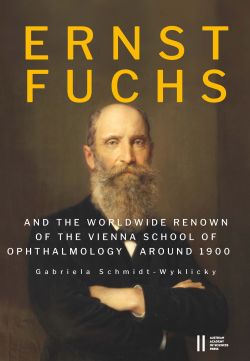


For the first time, a complete scientific monograph
dealing with the life and work of the ophthalmologist
Ernst Fuchs (1851-1930) is presented. Not only
within the Vienna School of Ophthalmology, but even
internationally, he is considered the most important
Austrian ophthalmologist from the turn of the 19th to
the 20th century. Following the new guidelines issued
by the 2nd Vienna Medical School, Fuchs based his
understanding of eye diseases on the pathological
changes in the ocular tissues uncovered by his extensive
histological research. Thus, Fuchs was able to identify
numerous new ocular diseases, most of them still bearing
his name. Due to his innovative teaching and his
Text-book of Ophthalmology, which was translated into
English, French, Italian, Spanish, Russian, Japanese
and Chinese, Fuchs gained the highest appreciation
worldwide. As a pioneer initiative, Fuchs expanded the
range of courses offered by the Vienna Medical Faculty
by establishing summer courses in ophthalmology in the
English language, which, from 1879 onwards, became
a regular institution. Thus, Fuchs gathered at his clinic
a great number of disciples from all over the world.
Up to the beginning of World War I, they transferred
the doctrines of the Vienna School of Ophthalmology
to their home countries and often founded eye clinics
according to the model of their teacher. After his
voluntary retirement in 1915, extensive travel enabled
Fuchs to visit his former disciples on all continents of
the world except Australia. For several weeks he held
postgraduate courses and lectures on special topics.
The main destinations of his international teaching
were the USA, Japan, and China. Through all these
achievements, Fuchs raised the Vienna School of Ophthalmology
to the international leading position within
this specialty for five decades.
Published with the support of Austrian Science Fund (FWF)

…
Erstmals wird eine umfassende wissenschaftliche Monografie über Leben und Wirken des Ophthalmologen Ernst Fuchs (1851-1930) vorgelegt. Er gilt nicht nur innerhalb der Wiener Ophthalmologischen Schule, sondern auch international als bedeutendster österreichischer Fachvertreter der Augenheilkunde an der Wende vom 19. zum 20. Jahrhundert. Durch intensive histologische Forschungsarbeiten festigte Fuchs die ophthalmologische Krankheitslehre gemäß den neuen Maximen der II. Wiener Medizinischen Schule auf den pathologischen Gewebeveränderungen des Auges. Dies ermöglichte Fuchs die Abgrenzung zahlreicher neuer Krankheitsbilder, die vielfach noch heute seinen Namen tragen. Durch seine innovative, internationale Lehrtätigkeit sowie durch sein epochales Lehrbuch der Augenheilkunde, das ins Englische, Französische, Italienische, Spanische, Russische, Japanische und Chinesische übersetzt wurde, genoss Fuchs weltweit höchstes Ansehen. Auf Ernst Fuchs geht auch die erstmalige Einführung von Sommerkursen in englischer Sprache an der Medizinischen Fakultät der Universität Wien zurück, die ab 1879 regelmäßig gehalten wurden. So versammelte Fuchs an seiner Klinik bald zahlreiche Schüler aus aller Welt. Diese trugen die Lehren der Wiener Ophthalmologischen Schule bis zum Beginn des I. Weltkrieges in ihre Heimatländer in alle Welt und gründeten oftmals Augenkliniken nach dem Vorbild ihres Lehrers. Nach seiner freiwilligen Emeritierung 1915 besuchte Fuchs in ausgedehnten Reisen viele dieser ehemaligen Schüler und hielt Vorträge und mehrwöchige Spezialkurse zur postgraduellen Weiterbildung. Schwerpunktziele seiner internationalen Lehrtätigkeit waren die USA, Japan und China. Durch all diese Leistungen erhob Fuchs die Wiener Ophthalmologische Schule durch fünf Jahrzehnte zur internationalen Führungsposition innerhalb seines Fachgebietes.
2022,
978-3-7001-9158-2
978-3-7001-9160-5
640 pages with numerous colour and b/w images,
24x17cm, hardcover, english